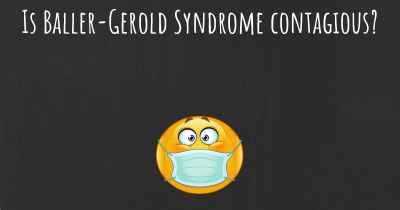Baller-Gerold Syndrome and depression
Can Baller-Gerold Syndrome cause depression? Could it affect your mood? Find out how Baller-Gerold Syndrome can affect your mood.

Baller-Gerold Syndrome is a rare genetic disorder characterized by skeletal abnormalities and craniosynostosis, which is the premature fusion of the skull bones. This condition is caused by mutations in the RECQL4 gene, which is involved in DNA replication and repair. Individuals with Baller-Gerold Syndrome may experience a range of physical and developmental challenges.
One aspect that can significantly impact the lives of individuals with Baller-Gerold Syndrome is the potential association with depression. While not all individuals with this syndrome will experience depression, studies have shown a higher prevalence of depressive symptoms in this population compared to the general population.
Depression is a mental health disorder characterized by persistent feelings of sadness, loss of interest or pleasure in activities, changes in appetite or weight, sleep disturbances, fatigue, feelings of worthlessness or guilt, difficulty concentrating, and even thoughts of self-harm or suicide. It is important to note that depression is a complex condition influenced by various factors, including genetic predisposition, environmental factors, and life circumstances.
The exact relationship between Baller-Gerold Syndrome and depression is not fully understood. However, it is believed that the challenges associated with the physical and developmental aspects of the syndrome, as well as the potential impact on self-esteem and social interactions, may contribute to the development of depressive symptoms.
It is crucial to recognize the signs of depression in individuals with Baller-Gerold Syndrome and provide appropriate support and treatment. Early intervention is key to managing depression effectively. This may involve a combination of therapies, such as cognitive-behavioral therapy (CBT) and medication, if necessary. CBT can help individuals identify and change negative thought patterns and behaviors, while medication can help regulate brain chemistry and alleviate symptoms.
Additionally, a strong support system is essential for individuals with Baller-Gerold Syndrome. This can include family, friends, healthcare professionals, and support groups. Encouraging open communication and providing a safe space for individuals to express their feelings can make a significant difference in their well-being. It is important to foster a sense of belonging and acceptance, promoting self-esteem and resilience.
In conclusion, Baller-Gerold Syndrome is a rare genetic disorder characterized by skeletal abnormalities and craniosynostosis. While not all individuals with this syndrome will experience depression, there is a higher prevalence of depressive symptoms in this population. Understanding the potential association between Baller-Gerold Syndrome and depression is crucial in providing appropriate support and intervention. Early recognition, therapy, medication, and a strong support system can help individuals manage their mental health effectively and improve their overall quality of life.








